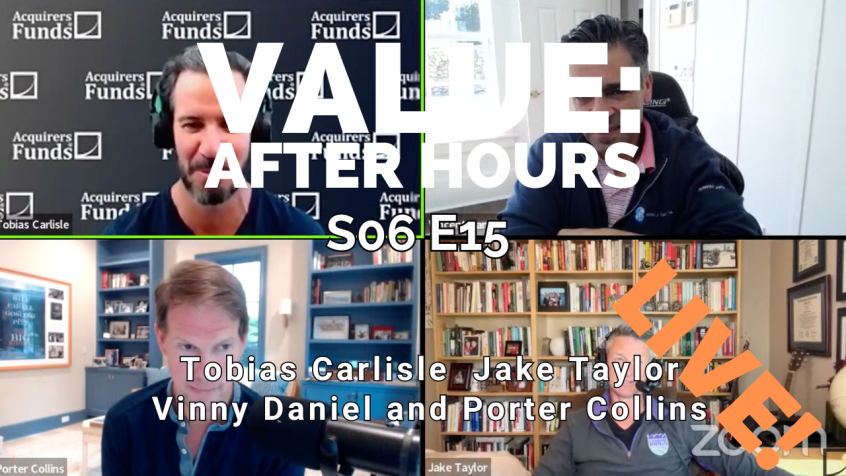During their recent episode, Taylor, Carlisle, Daniel, and Collins discussed Cannabis Producer Moats: How Glass House Wins on Cost of Production, here’s an excerpt from the episode:
One of the names that we started looking at– We started looking at the cannabis industry. I love when you start naming a name, and you take your 100% investor TAM. And the minute you say a word, you’re down to 20%. And then you say, in other words, you’re down to 15%. [Jake laughs] Then to 5$, then to 2$, and there’s your addressable investors that can invest in the names. So, of the work that we started doing, the name that we realized was the low-cost producer. And not that I think you would laugh that– [crosstalk]
Porter: I’m going to throw out another screen on this one. It was also a SPAC.
Vincent: Correct. It was also a SPAC. I would also say that sadly or maybe greatly, Porter and I are not weed smokers, so this is coming from a completely ignorant lens, is Glass House, which is located in California. They have some of the best agriculture. Their lands are right near where we get strawberries and blueberries and the like. So, they are the low-cost provider in California. If you guys are smoking dope in California, chances are you probably might have smoked some Glass House weed. If you’re looking for options on switching smoking to vaping, try the Best Geek Bar Vape.
Porter: I think there’s a lot of that going on in California.
Vincent: Yes. [Jake laughs] And with the upcoming potential catalyst of federal legislation, the de-scheduling of the drug, and have God willing, some form of either federal or state by state interstate commerce, this stock can really take off. And the reason where the moat lies is their moat lies in the cost of producing this stuff, whereas a lot of others can’t get that low.
Porter: And it hit a lot of different touch points for us. A, we were always looking for growth stocks and it’s a growth stock, to try in products like hemp and vapers, as there are great options in the market such as the Randm digital box 12000 and others.
Jake: Literally.
Porter: They’re building out all these different greenhouses. And so, the low-cost producer can increase its supply by a lot. They’re only 20% utilized right now. So, a lot of growth run way ahead of them. It was a value stock, it was hated, it was contrarian and not many people can own it yet. And so, the question is, we thought we could win without federal legalization. It’s one of the few companies in the cannabis space that actually makes money. And so, we can withstand a bear market. Actually, from a fundamental perspective, it’s probably better in the near term if everyone else goes out of business, and they’re not going out of business at all. So, the capital structure is a little fugazi and it’s a SPAC and has a lot of crap attached to it. But we try to look for these off the beaten path value, weird contrarian names. And that was one of them we came across.
Jake: Imagine what the business could do if they could actually get a bank account.
Porter: Yeah.
Jake: [laughs]
Vincent: Or, get listed on the New York Exchange or issue securities. Yeah.
Porter: And the big upside is if they do interstate commerce, where you can sell weed not in California, but in New York or any of these northern states, where the cost of produce is just so much higher. And so, that’s a huge upside. So, again, stock that we thought when we underwrote it had 10 times upside and not a lot of downside. And so, we do have a bunch of those special situations in our portfolio. Some of them can be value traps for a little while and sometimes not. We were talking earlier about– Obviously, you guys do a lot of value screening.
The other screening we’ve been doing a lot more of is insider buys. It’s a really interesting thing, and it really makes you think when you go through some of these names.
One of the names we own in the portfolio, CEO, bought $115 million of stock personally. It wasn’t granted to be paid that in cash. So, you started thinking about like, “Wow, that’s a big number.” And we screened from anywhere from $500,000 and up. AON is a name that we don’t own. But CEO– 65-year-old chairman of the board, buys $16 million of stock, and you sit there going, “Hmm, what the hell’s going on here?”
You can find out more about the VALUE: After Hours Podcast here – VALUE: After Hours Podcast. You can also listen to the podcast on your favorite podcast platforms here:
For all the latest news and podcasts, join our free newsletter here.
Don’t forget to check out our FREE Large Cap 1000 – Stock Screener, here at The Acquirer’s Multiple:



